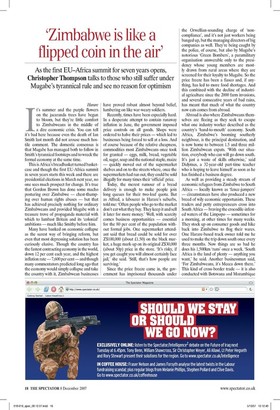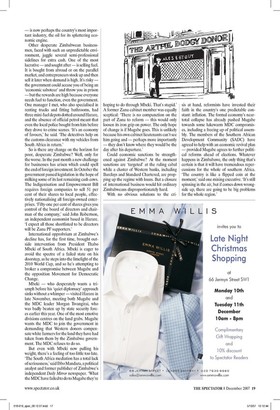'Zimbabwe is like a flipped coin in the air'
As the first EU—Africa summit for seven years opens, Christopher Thompson talks to those who still suffer under Mugabe's tyrannical rule and see no reason for optimism Harare 1 t's summer and the purple flowers on the jacaranda trees have begun to bloom, but they're little comfort to Zimbabweans in the middle of a dire economic crisis. You can tell it's bad here because even the death of Ian Smith last month did not arouse much hostile comment. The domestic consensus is that Mugabe has managed both to follow in Smith's tyrannical footsteps and to wreck the formal economy at the same time.
This is Africa's breadbasket turned basketcase and though the first EU-Africa summit in seven years starts this week and there are presidential elections in March next year, no one sees much prospect for change. It's true that Gordon Brown has done some macho posturing over Zimbabwe — chest-thumping over human rights abuses — but that has achieved precisely nothing for ordinary Zimbabweans and provided Mugabe with a treasure trove of propaganda material with which to lambast Britain and its 'colonial' ambitions — much like Smithy before him Many have banked on economic collapse as the surest way of bringing reform, but even that most depressing solution has been curiously elusive. Though the country has the fastest contracting economy in the world, down 12 per cent each year, and the highest inflation rate — 7,600 per cent — and though many commentators predicted long ago that the economy would simply collapse and take the country with it, Zimbabwean businesses have proved robust almost beyond belief, lumbering on like war-weary soldiers.
Recently, times have been especially hard. In a desperate attempt to contain runaway inflation in June, the government imposed price controls on all goods. Shops were ordered to halve their prices — which led to businesses being forced to sell at a loss. And of course because of the relative cheapness, commodities most Zimbabweans once took for granted — eggs, milk, bread, vegetable oil, sugar, soap and the national staple, maize — quickly moved out of the supermarket shelves and on to the streets where, once the supermarkets had run out, they could be sold illegally for many times their 'official' price.
Today, the merest rumour of a bread delivery is enough to make people join long queues for their two-loaf quota. But as Alfred, a labourer in Harare's suburbs, told me: 'Often people who go to the market don't eat what they buy. They keep it and sell it later for more money.' Well, with scarcity comes business opportunities — essential for the 80 per cent of the population without formal jobs. One supermarket attendant said that bread could be sold for over Z$100,000 (about £1.50) on the black market, a huge mark-up on its original Z$30,000 (about 50p) price in the store. 'It's risky, if you get caught you will almost certainly face jail,' she said. 'Still, that's how people are surviving.'
Since the price freeze came in, the government has imprisoned thousands under the Orwellian-sounding charge of 'noncompliance', and it's not just workers being banged up, but the managing directors of big companies as well. They're being caught by the police, of course, but also by Mugabe's notorious 'Green Bombers', a paramilitary organisation answerable only to the presidency whose young members are mostly drawn from rural areas where they are screened for their loyalty to Mugabe. So the price freeze has been a fiasco and, if anything, has led to more food shortages. And this combined with the decline of industrial agriculture since the 2000 farm invasions, and several consecutive years of bad rains, has meant that much of what the country now eats comes from abroad.
Abroad is also where Zimbabweans themselves are fleeing as they seek to escape what one industry worker described as the country's 'hand-to-mouth' economy. South Africa, Zimbabwe's booming southerly neighbour, is the principal destination, and is now home to between 1.5 and three million Zimbabwean expats. 'With our situation, everybody who can will go down south. It's just a waste of skills otherwise,' said Didymus, a 32-year-old part-time teacher who is hoping to leave himself as soon as he has finished a business degree.
As well as providing a steady stream of economic refugees from Zimbabwe to South Africa — locally known as 'fence-jumpers' — circumstances have also produced a new breed of wily economic opportunists. These traders and petty entrepreneurs cross into South Africa — braving the crocodile-infested waters of the Limpopo — sometimes for a morning, at other times for many weeks. They stock up on consumer goods and hike back into Zimbabwe to flog their wares. One Harare-based truck owner told me he used to make the trip down south once every three months. Now things are so bad he does his 1,500km 'runs' once a week. 'South Africa is the land of plenty — anything you want,' he said. Another businessman said, Tor Zimbabweans, it's Mecca down there.' This kind of cross-border trade — it is also conducted with Botswana and Mozambique — is now perhaps the country's most important industry, the oil for its spluttering economic engine.
Other desperate Zimbabwean businessmen, faced with such an unpredictable environment, juggle several semi-professional sidelines for extra cash. One of the most lucrative — and sought after — is selling fuel. It is bought from abroad or on the parallel market, and entrepreneurs stock up and then sell it later when demand is high. It's risky — the government could accuse you of being an 'economic saboteur' and throw you in prison — but the rewards are high because everyone needs fuel to function, even the government. One manager I met, who also specialised in renting trucks and fitting bathrooms, had three mini-fuel depots dotted around Harare, and the absence of official petrol meant that even the local police bought from him before they drove to crime scenes. 'It's an economy of favours,' he said. 'The detectives help on the customs clearance with my vehicles from South Africa in return.'
So is there any change on the horizon for poor, desperate Zimbabwe? Well, only for the worse. In the past month a new challenge for businesses has arisen which could spell the end of foreign investment. In October the government passed legislation in the hope of milking some of its last remaining cash cows. The Indigenisation and Empowerment Bill requires foreign companies to sell 51 per cent of their shares to local people, effectively nationalising all foreign-owned enterprises. 'Fifty-one per cent of shares gives you control of the board of directors and chairman of the company,' said John Robertson, an independent economist based in Harare. 'I expect all those shortlisted to be directors will be Zanu PF supporters.'
International opprobrium at Zimbabwe's decline has, for the first time, brought outside intervention from President Thabo Mbeki of South Africa. Mbeki is eager to avoid the spectre of a failed state on his doorstep, as he steps into the limelight of the 2010 World Cup, and so he's attempting to broker a compromise between Mugabe and the opposition Movement for Democratic Change.
Mbeki — who desperately wants a triumph before his 'quiet diplomacy' approach sinks without a whimper — visited Harare in late November, meeting both Mugabe and the MDC leader Morgan Tsvangirai, who was badly beaten up by state security forces earlier this year. One of the most emotive divisions centres on the land grabs. Mugabe wants the MDC to join the government in demanding that Western donors compensate white farmers for the land they have had taken from them by the Zimbabwe government. The MDC refuses to do so.
But even with Mbeki now pulling his weight, there's a feeling of too little too late. 'The South Africa mediation has a total lack of seriousness,' said Ibbo Mandaza, apolitical analyst and former publisher of Zimbabwe's independent Daily Mirror newspaper. 'What the MDC have failed to do to Mugabe they're hoping to do through Mbeki. That's stupid.' A former Zanu cabinet member was equally sceptical: 'There is no compunction on the part of Zanu to reform — this would only loosen its iron grip on power. The only hope of change is if Mugabe goes. This is unlikely because his own cabinet lieutenants can't see him going and — perhaps more importantly — they don't know where they would be the day after his departure.'
Could economic sanctions be strengthened against Zimbabwe? At the moment sanctions are 'targeted' at the ruling cabal while a cluster of Western banks, including Barclays and Standard Chartered, are propping up the regime with loans. But a closure of international business would hit ordinary Zimbabweans disproportionately hard.
With no obvious solutions to the crisis at hand, reformists have invested their faith in the country's one predictable constant: inflation. The formal economy's neartotal collapse has already pushed Mugabe towards some lukewarm MDC compromises, including a freeing up of political assembly. The members of the Southern African Development Community (SADC) have agreed to help with an economic revival plan — provided Mugabe agrees to further political reforms ahead of elections. Whatever happens in Zimbabawe, the only thing that's certain is that it will have tremendous repercussions for the whole of southern Africa. 'The country is like a flipped coin at the moment,' said one mining executive. 'It's still spinning in the air, but if comes down wrongside up, there are going to be big problems for the whole region.'


























































 Previous page
Previous page